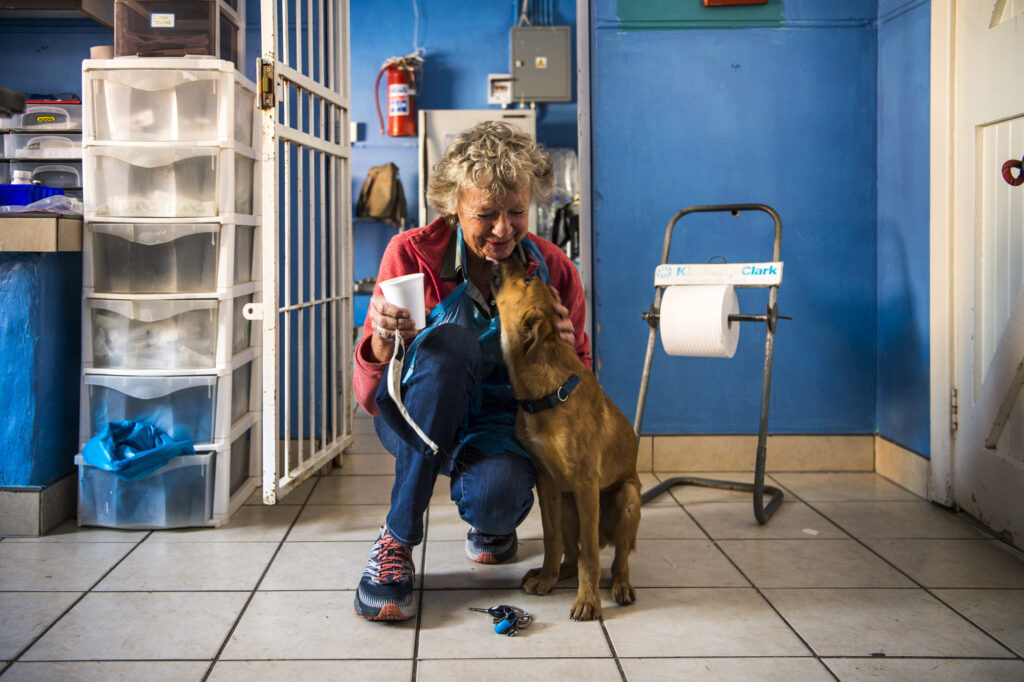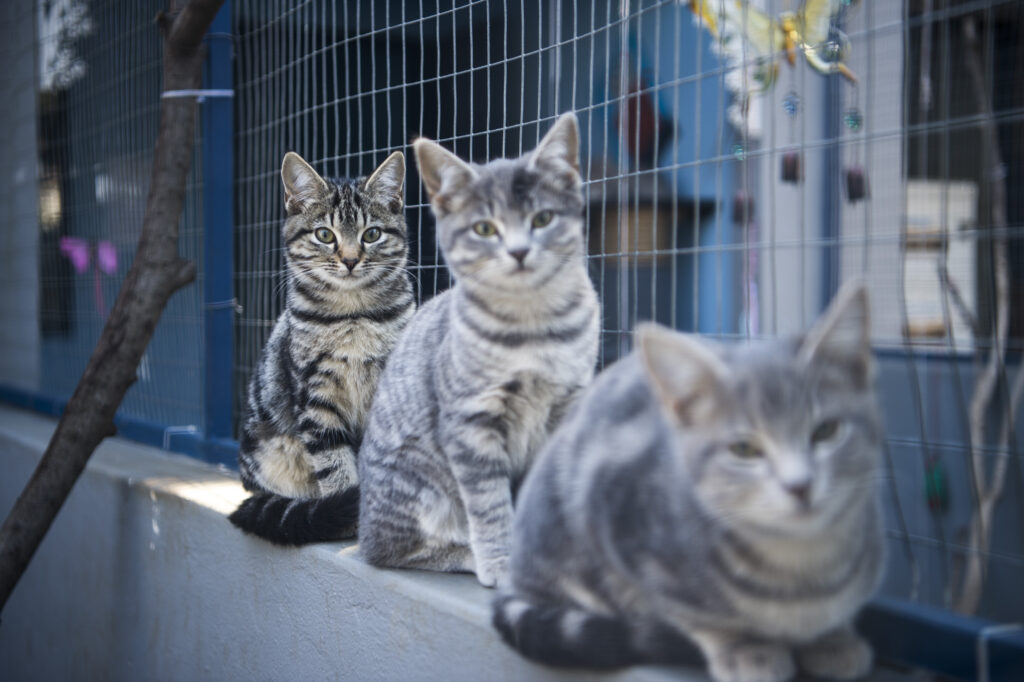Founders’ love: Samantha Berger, of the pro-life nonprofit Kitty and Puppy Haven. (Delwyn Verasamy/M&G)
Samantha Berger is used to living on the edge. It’s what makes her well suited to the often precarious nature of her work — saving and sheltering animals.
Even good days are fraught: money is never easy to come by, but the joy of nursing stray cats and dogs back to health is well worth it. The crisis triggered by the coronavirus pandemic has, however, dwarfed any other she has faced in the two decades since she founded Kitty and Puppy Haven, a pro-life sanctuary in Midrand.
“All in all it has been a financial and emotional rollercoaster to be perfectly honest,” Berger says.
“We are working with emotional things at the best of times. So it puts your stress levels and your emotions on a seesaw because it is just like an absolute blank wall. You don’t know where you are going. You don’t know how you are going to get these babies into homes.”
The shelter, which takes in about 1 600 stray cats and dogs for rehoming each year, closed its doors in the week before the start of the March 27 lockdown. The immediate effect was a drop in adoptions, which resulted in the shelter not being able to take in more animals.
600 stray cats and dogs for rehoming each year, closed its doors in the week before the start of the March 27 lockdown. The immediate effect was a drop in adoptions, which resulted in the shelter not being able to take in more animals.
But the economic aftermath of the lockdown could be even more devastating for shelters such as Berger’s. People struggling to feed themselves are forced to give up their pets and at the same time the donations that keep animal welfare organisations afloat are drying up.
“Your adoptions aren’t what make up your money at all,” Berger
says. “What does worry me financially is donations. Companies aren’t going to be able to sponsor us. Before there were companies that were able to come in and give you food. Now suddenly they don’t have money to give you food. They
don’t have that extra money.”
The coronavirus pandemic, and efforts by governments to curb infections, has set in motion a crisis for animal welfare organisations globally.
In March, the Society for the Prevention of Cruelty to Animals (SPCA) International reported that animal shelters around the world were “facing dire impacts due to the devastating fallout of the Covid-19 pandemic”. According to the organisation, shelters were hit by food shortages, high numbers of abandoned pets and plummeting adoption rates in heavily affected countries.
Weeks later, the organisation released a statement suggesting these conditions had worsened in the wake of lockdowns.
In the United States, as animal rescue operations closed their doors during the lockdown, pleas to boost adoptions were answered. In April the American SPCA reported a
70% increase in animals entering foster care in New York and Los Angeles.
As the Covid-19 crisis deepened, the SPCA in South Africa asked members of the public unable to afford to take care of their pets to surrender them to shelters rather than abandoning, dumping or discarding them.
“We also remind the public that while they are taking care of themselves, to remember their animals … at this time too, to ensure that there is adequate provision of the necessary resources for survival.”
Berger concedes that she ends up adopting to well-off families, who won’t feel the economic pinch of the lockdown as keenly as many others. But, she says, the effect of the coronavirus on less financially secure households will have a knock-on effect on how animal welfare organisations will be able to cope.
‘They howl. Some of them just shut down’
Every evening Cora Bailey writes a mental diary on the way home from the clinic so she does not end up “off-loading” on her husband.
 Cora Bailey of Claw, which provides vetinarary services in poor areas of Johannesburg. (Delwyn Verasamy/M&G)
Cora Bailey of Claw, which provides vetinarary services in poor areas of Johannesburg. (Delwyn Verasamy/M&G)
As the director and founder of the Community Led Animal Welfare (Claw) — which provides veterinary services to pet owners living in townships on the West Rand — Bailey is on the frontline of a crisis that has left many clamouring for help to take care of their animals.
“We haven’t been able to lock down at all, because animals don’t stop getting sick. And our communities cannot afford to take their animals elsewhere,” she says. “And of course the harder it becomes to get food for themselves, the harder it is to feed their animals. So it has been a bit crazy here during lockdown. Today I actually thought I might be arrested. And I weirdly thought to myself, ‘Wouldn’t it be nice?’”
Ordinarily Claw asks for a small donation from people seeking veterinary care, but “pretty much nobody has been able to donate”, Bailey says.
As people lose their jobs, more animals are taken to Claw. “Some days we get two or three. Other days we get seven or eight. It’s more than we have ever experienced before.
“There is heartbreak every day. We can’t keep every animal alive. It would be impractical to take in every animal and put it in a cage. And some of them cry at being left behind. They howl. Some of them just shut down. There aren’t a thousand people looking to adopt now, because everyone is thinking about their own future.”
 Financial crunch: Donations for the Kitty and Puppy Haven in Midrand are drying up as companies and individuals feel the effect of the Covid-19 lockdown on the economy. (Delwyn Verasamy/M&G)
Financial crunch: Donations for the Kitty and Puppy Haven in Midrand are drying up as companies and individuals feel the effect of the Covid-19 lockdown on the economy. (Delwyn Verasamy/M&G)
Despite scant funding, and the risk of contracting the virus, staff members do their best to keep Claw alive. “We’re working terribly, terribly hard. But if we weren’t there, then there would have been a lot of animals dying,” Bailey says. “But, I mean, where do you go if you don’t have a vehicle and your dog has two broken legs? You cannot hop into a car and go to a private practice.
“So we can’t shut our doors. We’re dealing with a community where people are as much entitled to have a pet, and to have the companionship of animals, as everyone else.”